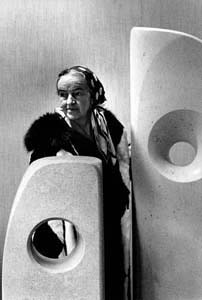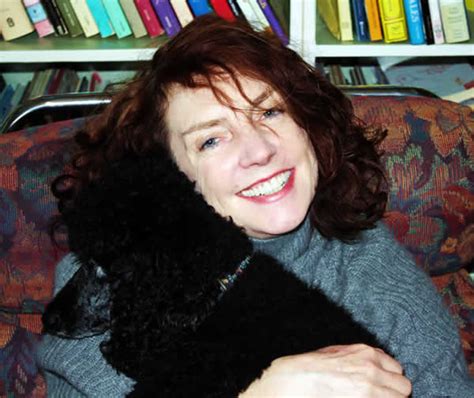A Quote by Barbara Hepworth
All my early memories are of forms and shapes and textures. Moving through and over the West Riding landscape with my father in his car, the hills were sculptures; the roads defined the form. Above all, there was the sensation of moving physically over the contours of fullnessess and concavities, through hollows and over peaks - feeling, touching, seeing, through mind and hand and eye. This sensation has never left me. I, the sculptor, am the landscape. I am the form and the hollow, the thrust and the contour.
Related Quotes
But what a feeling can come over a man just from seeing the things he believes in and hopes for symbolized in the concrete form of a man. In something that gives a focus to all the other things he knows to be real. Something that makes unseen things manifest and allows him to come to his hopes and dreams through his outer eye and through the touch and feel of his natural hand.
I come from under the hill, and under the hills and over the hills my paths led. And through the air. I am he that walks unseen. I am the clue-finder, the web-cutter, the stinging fly. I was chosen for the lucky number. I am he that buries his friends alive and drowns them and draws them alive again from the water. I came from the end of a bag, but no bag went over me. I am the friend of bears and the guest of eagles. I am Ringwinner and Luckwearer; and I am Barrel-rider.
Roads go ever ever on, Over rock and under tree, By caves where never sun has shone, By streams that never find the sea; Over snow by winter sown, And through the merry flowers of June, Over grass and over stone, And under mountains of the moon. Roads go ever ever on Under cloud and under star, Yet feet that wandering have gone Turn at last to home afar. Eyes that fire and sword have seen And horror in the halls of stone Look at last on meadows green And trees and hills they long have known
The pleasure a man gets from a landscape would [not] last long if he were convinced a priori that the forms and colors he sees are just forms and colors, that all structures in which they play a role are purely subjective and have no relation whatsoever to any meaningful order or totality, that they simply and necessarily express nothing....No walk through the landscape is necessary any longer; and thus the very concept of landscape as experienced by a pedestrian becomes meaningless and arbitrary. Landscape deteriorates altogether into landscaping.
It is true that I can trip over anything and nothing – a speck of dust, a patch of sunlight, an idea. I move through life like a person with one eye, through a landscape that looks flat, but is really tricked out with hidden depths and shallows. It didn’t use to be so, but no matter. I navigate the world well enough in my own way.
Some of the memories were not clear - -dim human memories, seen through weak eyes and heard through weak ears: the first time I'd seen his face... the way it felt when he'd held me in the meadow... the sound of his voice through the darkness of my faltering consciousness when he'd save me from James... his face as he waited under a canopy of flowers to marry me... every precious moment on the island... his cold hands touching our baby through my skin.
The difference between a path and a road is not only the obvious one. A path is little more than a habit that comes with knowledge of a place. It is a sort of ritual of familiarity. As a form, it is a form of contact with a known landscape. It is not destructive. It is the perfect adaptation, through experience and familiarity, of movement to place; it obeys the natural contours; such obstacles as it meets it goes around.
The rhythm of walking generates a kind of rhythm of thinking, and the passage through a landscape echoes or stimulates the passage through a series of thoughts. The creates an odd consonance between
internal and external passage, one that suggests that the mind is also a landscape of sorts and that walking is one way to traverse it. A new thought often seems like a feature of the landscape that was
there all along, as though thinking were traveling rather than making.
Through death you find yourself, because you no longer identify with form. You realize you are not the form with which you had identified neither the physical nor the psychological form of "me". That form goes. It dissolves and who you are beyond form emerges through the opening where that form was. One could almost say that every form of life obscures God.
All through the night
I'll be standing over you
All through the night
I'll be watching over you
And through the bad dreams
I'll be right there,
Baby holding your hand,
Telling you everything is all right.
And when you cry
I'll be right there
Telling you were never
Anything less than beautiful.
So don't worry
I'm your Angel standing by.






































